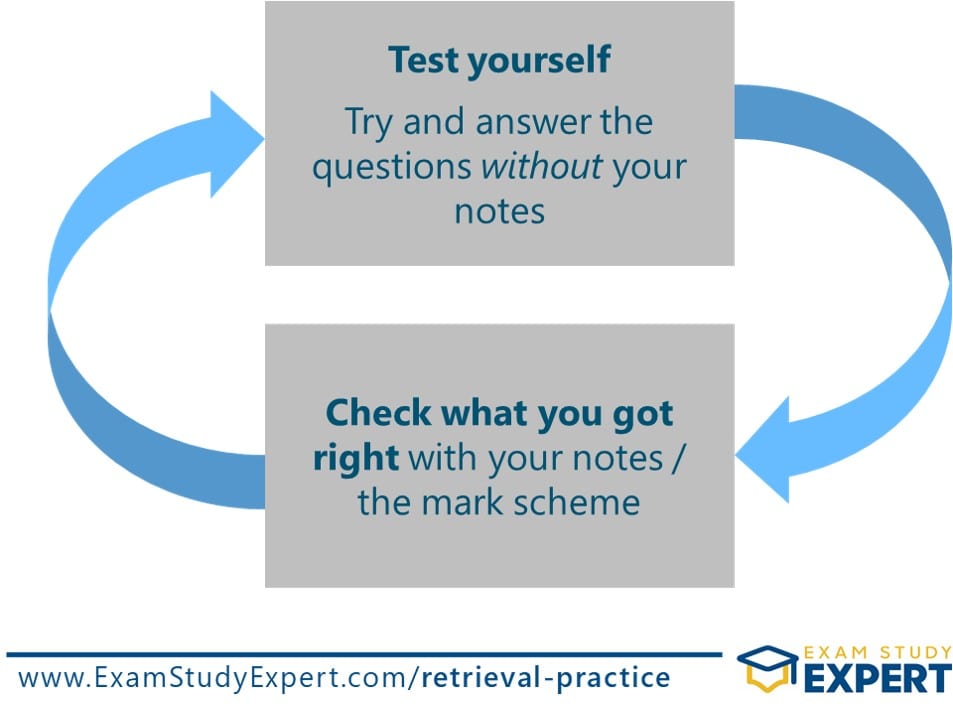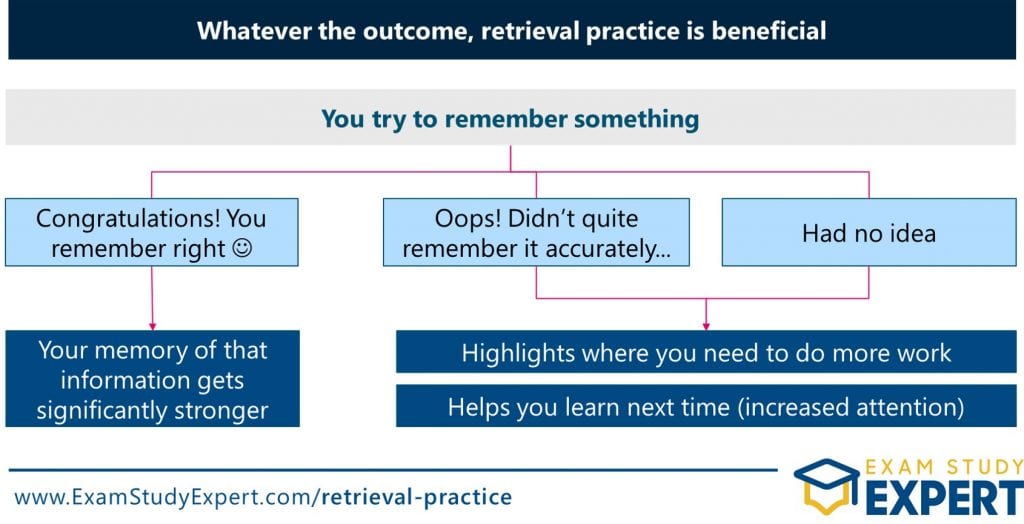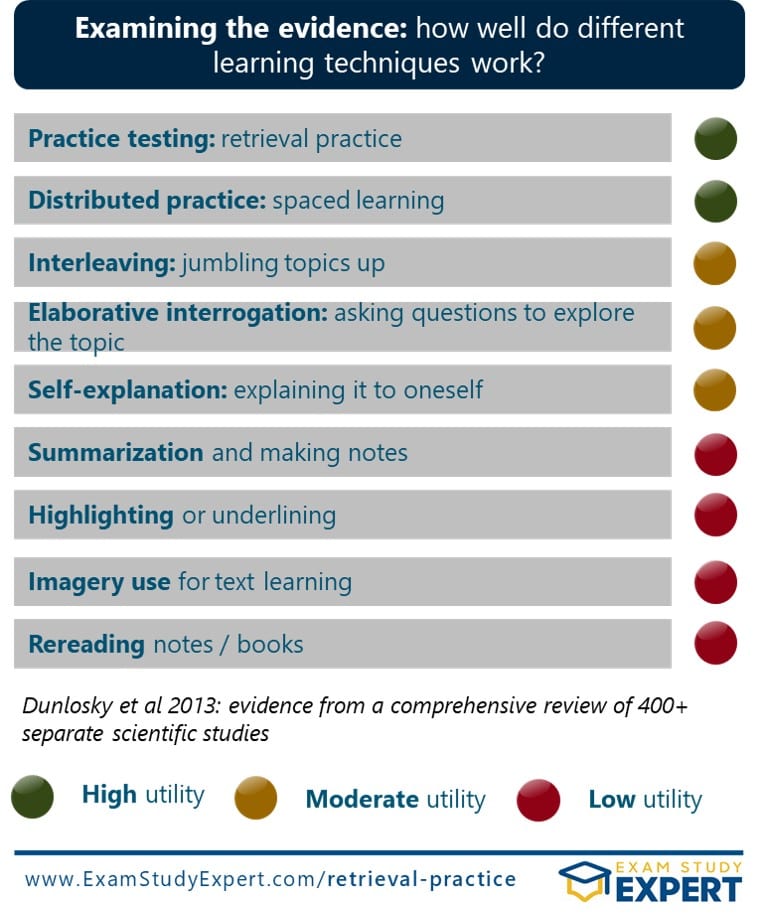Retrieval practice is, in my view, the single most powerful tool to build lasting knowledge in teaching and learning (I rate spaced learning as a close second).
A curious peculiarity of our memory is that things are impressed better by active than by passive repetition. I mean that in learning (by heart, for example), when we almost know the piece, it pays better to wait and recollect by an effort within, than to look at the book again. If we recover the words the former way, we shall probably know them the next time; if in the latter way, we shall likely need the book once more.
William James, The Principles of Psychology (1890)
By William Wadsworth, the Cambridge University trained cognitive psychologist and specialist in how to study smarter, not harder. He leads the world’s largest research study on use of effective learning strategies, is regular exam prep expert for The Times, and hosts the Exam Study Expert podcast, with 1 million downloads to date.
Additional research. graphics, and article review by Dr Kerri-Anne Edinburgh
What is retrieval practice?
A definition:
In psychology, retrieval practice is the act of bringing information to mind from memory, rather than by absorbing information passively through your senses such as sight (e.g. rereading the information) or hearing (e.g. listening to an explanation or watching a video).
(Roediger & Butler, 2011)
Often referred to as “active learning” by students and teachers.
What is the testing effect: a second definition
In psychology, the “testing effect” refers to the improvement in the speed and durability of learning that is brought about by using retrieval practice in preference to other learning strategies.
(Roediger & Butler, 2011)
The “testing effect” is entirely reliant on retrieval practice, but the latter is not limited to just testing. The format doesn’t have to be a test at all, so long as you’re bringing information to mind from memory. It could simply be closing your eyes for a second and trying to remember a key new word you learned that day on the bus home.
Key points about using retrieval practice
Here are 9 key points to remember when applying retrieval practice in teaching or studying:
- For students, retrieval practice means testing yourself on what you know, rather than simply re-reading or writing out notes. Check out my article on memorizing for exams for a guide to using retrieval practice in studying.
- For teachers, retrieval practice means low-stakes quizzing in class: frequent opportunities for students to remember what they’ve previously been taught in a low-consequence exercise. For ideas and guidance on applying retrieval in the classroom, I recommend retrievalpractice.org, which is run by scientists with considerable experience in applying the concepts in education.
- Some exposure to the knowledge in the first place will be necessary before doing retrieval practice. The trick is to move into retrieval mode as soon as possible (and probably, before it feels truly “comfortable” to do so!).
- Following point (3): don’t wait “until you’ve learned it” to start doing retrieval!! That’s missing the point – the retrieval practice IS the learning, it’s not about checking what you know, it’s the process by which you build the memory.
- Used well, retrieval should involve two distinct phases: testing, then feedback. In the classroom, this means giving clear feedback after a low-stakes quiz. For students, this might be as simple as flipping a flashcard to find out what the right answer was on the back. Or, it might mean spending time carefully marking a set of practice questions against a mark scheme if available, or otherwise with reference to notes or books.

- Retrieval practice should feel “effortful”. It’s supposed to be hard work! Giving your brain a more robust workout today will build a stronger memory, and make the final test or exam feel far easier.
- All retrieval practice is beneficial, even if you didn’t get the answer right!

- Prioritise re-testing weaker areas more frequently.
- Remember that “right once” does not mean you’ll get it right every time. You’ll need to revisit it again in future (see the forgetting curve).
Does retrieval practice work? Evidence from studies
“Incorporating retrieval into educational activities represents a powerful way to enhance learning… retrieval is the key process for understanding and for promoting learning.” – Karpicke & Grimalidi, 2012, in a comprehensive review of hundreds of individual studies done on retrieval practice.
In the famous review of effective learning techniques, John Dunlosky and colleagues (2013) synthesised findings from over 400 (!) separate scientific studies across 10 different learning techniques. “Practice testing”, as they referred to retrieval practice, was one of only two techniques to earn a “high” utility rating – the other was distributed practice / spaced learning.

Retrieval practice has a direct effect on learning (Smith, Roediger & Karpicke, 2013): that means when we bring information back to mind from memory, we actually change the memory, making it stronger. (And more so than if we’d simply re-read that information.)
Don’t be tempted to dismiss retrieval as being “just about learning knowledge” as if that’s somehow inferior to real education! For one thing, “knowing your stuff” is almost always a valuable outcome for a course or qualification. And besides, retrieval practice has been shown to improve students’ ability to apply what they know in novel circumstances (Smith et al, 2016), and to synthesise material from different parts of a course.
Have fun!

By William Wadsworth, the Cambridge University trained cognitive psychologist and specialist in how to study smarter, not harder. He leads the world’s largest research study on use of effective learning strategies, is regular exam prep expert for The Times, and hosts the Exam Study Expert podcast, which has 1 million downloads to date.
Author Profile | About Us | Editorial Policy | Contact Us


